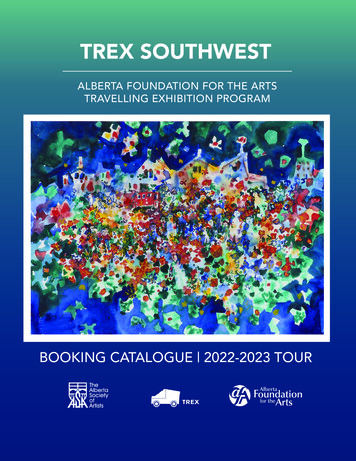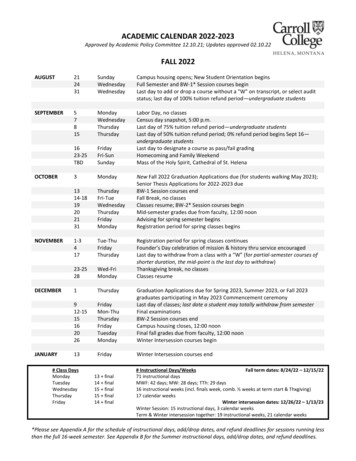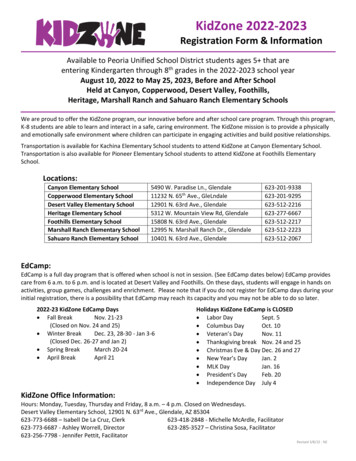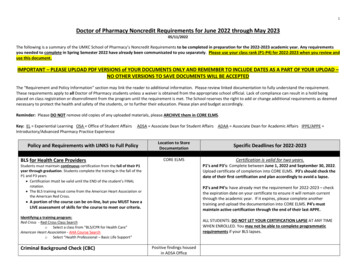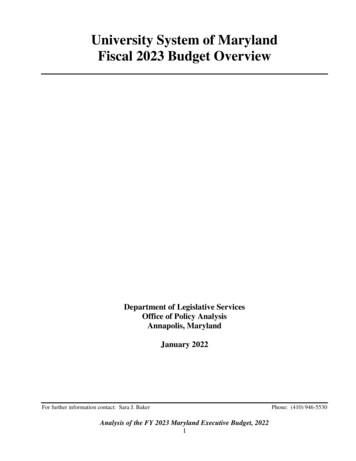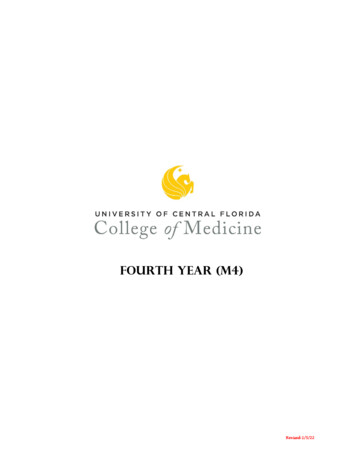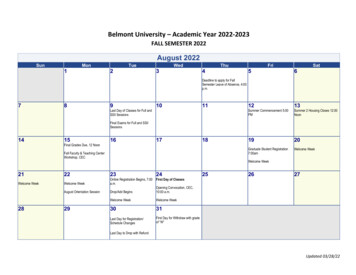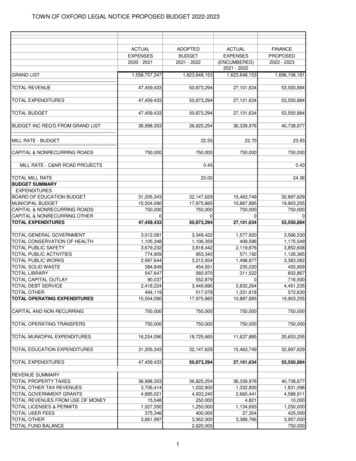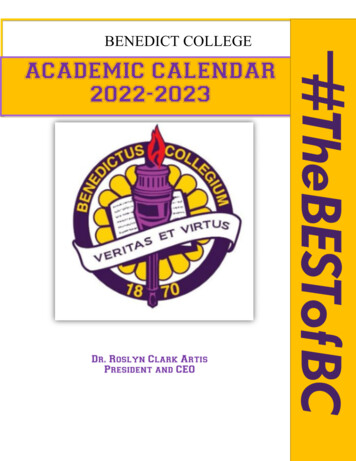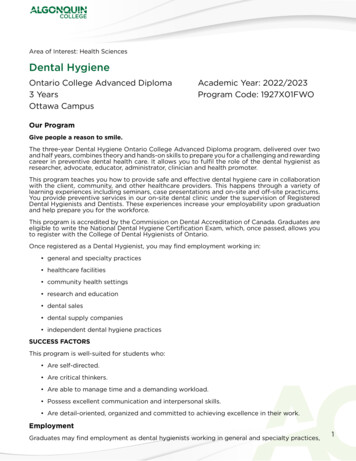
Transcription
Area of Interest: Health SciencesDental HygieneOntario College Advanced Diploma3 YearsOttawa CampusAcademic Year: 2022/2023Program Code: 1927X01FWOOur ProgramGive people a reason to smile.The three-year Dental Hygiene Ontario College Advanced Diploma program, delivered over twoand half years, combines theory and hands-on skills to prepare you for a challenging and rewardingcareer in preventive dental health care. It allows you to fulfil the role of the dental hygienist asresearcher, advocate, educator, administrator, clinician and health promoter.This program teaches you how to provide safe and effective dental hygiene care in collaborationwith the client, community, and other healthcare providers. This happens through a variety oflearning experiences including seminars, case presentations and on-site and off-site practicums.You provide preventive services in our on-site dental clinic under the supervision of RegisteredDental Hygienists and Dentists. These experiences increase your employability upon graduationand help prepare you for the workforce.This program is accredited by the Commission on Dental Accreditation of Canada. Graduates areeligible to write the National Dental Hygiene Certification Exam, which, once passed, allows youto register with the College of Dental Hygienists of Ontario.Once registered as a Dental Hygienist, you may find employment working in: general and specialty practices healthcare facilities community health settings research and education dental sales dental supply companies independent dental hygiene practicesSUCCESS FACTORSThis program is well-suited for students who: Are self-directed. Are critical thinkers. Are able to manage time and a demanding workload. Possess excellent communication and interpersonal skills. Are detail-oriented, organized and committed to achieving excellence in their work.EmploymentGraduates may find employment as dental hygienists working in general and specialty practices,1
Dental Hygieneindependent dental hygiene practices, healthcare facilities, such as hospital dental clinics and longterm care facilities, community health settings, research and education, dental sales and dentalsupply companies.Graduates must hold a credential as a Registered Dental Hygienist to practise in Ontario. In thefinal level of the program, students apply to the National Dental Hygiene Certification Board(NDHCB) to write the national exam upon graduation. Successful candidates are then eligible toapply for registration with the dental hygiene regulatory body in Ontario, the College of DentalHygienists of Ontario (CDHO).Learning OutcomesThe graduate has reliably demonstrated the ability to: Practice in a professional and competent manner within the defined scope of practice andconsistent with current regulations and standards of practice. Evaluate the client s oral health status using determinants of health and risk analysis toidentify needs, justify treatment decisions and provide appropriate referrals to other healthcare professionals as required. Design, implement and evaluate a range of primary, interceptive, therapeutic, preventativeand on-going oral health-care services to meet the unique needs of clients. Analyze oral health issues in need of advocacy, identify networks and promote actions thatwill support change and facilitate access to care. Identify, select, implement and evaluate quality assurance standards and protocols whichcontribute to a safe and effective working environment. Establish and maintain professional and inter-professional relationships which contribute toclient-care safety and positive health-care outcomes. Facilitate the development of specific oral health attitudes, knowledge, skills, and behavioursin clients by selecting and utilizing principles of teaching and learning. Develop and present a model for dental hygiene practice that addresses relevant businessprinciples, current legislation and standards of practice. Identify and apply discipline-specific practices that contribute to the local and globalcommunity through social responsibility, economic commitment and environmentalstewardship.Program of StudyLevel: 3SPSY1700Level: 6CoursesMicrobiology IHuman Anatomy and PhysiologyDental AnatomyPreclinic Practicum IPreclinic Practice Foundations IDental RadiographyCommunications IPsychosocial ScienceCoursesHead and Neck AnatomyMicrobiology IIOral Histology and EmbryologyRadiography Practicum IIAdvanced Dental AnatomyPreclinic Practice Foundations IIDental Materials 028.028.028.028.042.02
Dental HygieneDEN4418Oral Disease PreventionDEN4420Dental Practice CommunicationsDEN4422Preclinic Practicum IILevel: 03CoursesBIO4331Oral Pathology IBIO4333Human PathophysiologyDEN4423Nutrition and Dental HealthDEN4424Periodontics IDEN4426Population HealthDEN4428PharmacologyDEN4430Preclinic Practicum IIIDEN4432Preclinic Practice Foundations IIIDEN4434Dental Materials IILevel: 04CoursesBIO4334Oral Pathology IIDEN4436Periodontics IIDEN4438Community Dental Health PromotionDEN4440Professional Issues and EthicsDEN4442Clinic Practicum IDEN4445Clinic Practice Essentials IDEN4446Research MethodsChoose one from equivalencies:CoursesGED1927General Education ElectiveLevel: 05CoursesDEN4456Clinic Practicum IIDEN4459Clinic Practice Essentials IIDEN4460Business ConceptsDEN4462Evidence-Informed Practice IDEN4480Oral Health Outreach IENL5507Career Writing Practicum ILevel: 06CoursesDEN4448OrthodonticsDEN4464Dental Hygiene Practice ManagementDEN4469Evidence-Informed Practice IIDEN4472Clinic Practicum IIIDEN4475Clinic Practice ConsolidationDEN4477Comprehensive Case StudiesDEN4482Oral Health Outreach IIChoose one from equivalencies:CoursesGED1927General Education 0126.028.042.056.0Hours42.0Fees for the 2022/2023 Academic YearTuition and related ancillary fees for this program can be viewed by using the Tuition and FeesEstimator tool at https://www.algonquincollege.com/fee-estimator .Further information on fees can be found by visiting the Registrar s Office website athttps://www.algonquincollege.com/ro .Fees are subject to change.Additional program related expenses include:3
Dental Hygiene The fees to write the National Dental Hygiene Certification Exam (NDHCE) and to obtainCDHO registration are approximately 1150, plus applicable taxes (subject to change). Thesefees are current at the time of publication and are subject to change. Further information maybe obtained by browsing the CDHO ( http://www.cdho.org/ ) and NDHCB( http://www.ndhcb.ca/ ) websites. Hardcopy books, supplies and clinical items (uniforms, clinic shoes, lab coat, exam gloves,protective eyewear, masks, gowns and loupes (optional) cost approximately 7,500 (subjectto change) for the program duration. See tudentsfor more information about books. Select items can be purchased at the campus store.Admission Requirements for the 2023/2024 Academic YearCollege Eligibility Ontario Secondary School Diploma (OSSD) or equivalent. Applicants with an OSSD showingsenior English and/or Mathematics courses at the Basic Level, or with Workplace or Opencourses, will be tested to determine their eligibility for admission; OR Academic and Career Entrance (ACE) certificate; OR General Educational Development (GED) certificate; OR Mature Student status (19 years of age or older and without a high school diploma at thestart of the program). Eligibility may be determined by academic achievement testing forwhich a fee of 50 (subject to change) will be charged.Program Eligibility English, Grade 12 (ENG4C or equivalent) with a grade of 65% or higher. Mathematics, Grade 11 or 12 (MBF3C or MAP4C equivalent) with a grade of 65% or higher. Biology, Grade 11 or 12 with a grade of 65% or higher. Chemistry, Grade 11 or 12 with a grade of 65% or higher. All applicants must complete an assessment of their knowledge and skills through the TestCentre, and pay an exam fee. Results from the Algonquin College Health Program AdmissionsTest (AC-HPAT) will be utilized to establish minimum eligibility and applicant ranking. The ACHPAT can only be written once per academic cycle. For further information on the HPAT andhow to book your assessment, please visit Algonquin s Test Centre. Applicants with international transcripts must provide proof of the subject-specificrequirements noted above and may be required to provide proof of language proficiency.Domestic applicants with international transcripts must be evaluated through the InternationalCredential Assessment Service of Canada (ICAS) or World Education Services (WES). IELTS-International English Language Testing Service (Academic) Overall band of 6.5 witha minimum of 6.0 in each band; OR TOEFL-Internet-based (iBT)-overall 88, with a minimumof 22 in each component: Reading 22; Listening 22; Speaking 22; Writing 22.Not sure if you meet all of the requirements? Academic Upgrading may be able to help with that:https://www.algonquincollege.com/access/ .International Applicants:International applicants who meet the program eligibility requirements are required to completepreparatory courses (4-months in duration): Introduction to Canadian Health Studies (ICHS).Students who successfully complete the introduction will then proceed to their original healthprogram of choice. The ICHS requires applicants to submit an academic IELTS score.Please click this link for more information y/ICHS/ .Accepted applicants must complete ParaMed Requirements: Vulnerable Sector Police Check (annual).4
Dental Hygiene Clinical/Field Pre-Placement Health Form by week 8 of Program Start Date. Immunization for Hepatitis B is required. An immunization form for returning students must be submitted prior to the start of Level04. Provide evidence of a current cardiopulmonary resuscitation (CPR) certificate at the BasicLife Support (BLS). All CPR certification or recertification courses must include a hands-oncomponent. Online CPR courses are not acceptable. This requirement must remain currentuntil all program requirements are met. N95 mask fit testing. Provide evidence of a current Standard First Aid (13-hour course) certification. Thisrequirement must remain current until graduation from the program. Provide evidence of Workplace Hazardous Materials Information System (WHMIS) andOntario Health and Safety Awareness (OHSA) Training certification. These courses meetprogram requirements are free to registered students and can be accessed through theAlgonquin College website: -safety-training-resources/ .Successful completion of clinical placement is a requirement for graduation from the DentalHygiene program. Agencies that provide placement opportunities require you to have a clearPolice Records Check for Service with the Vulnerable Sector (PRCSVS). Your acceptance forplacement is at the discretion of the agency. If you register in the program without a clear PRCSVSand as a result are unable to participate in placement, you will not be able to graduate.Lab, Clinic and Placement Eligibility:To be eligible to participate in lab, clinic and placement activities, you must submit proof of a clearPRCSVS, which will be retained on your departmental file and used only for purposes related toyour lab, clinic and placement activities.It is your responsibility to obtain the PRCSVS from your local Police Department prior to thedeadline identified by your Department and to pay any associated costs. It may take 8-10 weeksto obtain this documentation; please submit your application as early as possible. Should yourequire further information, contact the Program Chair.Admission Requirements for 2022/2023 Academic YearCollege Eligibility Ontario Secondary School Diploma (OSSD) or equivalent. Applicants with an OSSD showingsenior English and/or Mathematics courses at the Basic Level, or with Workplace or Opencourses, will be tested to determine their eligibility for admission; OR Academic and Career Entrance (ACE) certificate; OR General Educational Development (GED) certificate; OR Mature Student status (19 years of age or older and without a high school diploma at thestart of the program). Eligibility may be determined by academic achievement testing forwhich a fee of 50 (subject to change) will be charged.Program Eligibility English, Grade 12 (ENG4C or equivalent) with a grade of 65% or higher. Mathematics, Grade 11 or 12 (MBF3C or MAP4C equivalent) with a grade of 65% or higher. Biology, Grade 11 or 12 with a grade of 65% or higher. Chemistry, Grade 11 or 12 with a grade of 65% or higher. All applicants must complete an assessment of their knowledge and skills through the TestCentre, and pay an exam fee. Results from the Algonquin College Health Program Admissions5
Dental Hygiene All applicants must complete an assessment of their knowledge and skills through the TestCentre, and pay an exam fee. Results from the Algonquin College Health Program AdmissionsTest (AC-HPAT) will be utilized to establish minimum eligibility and applicant ranking. The ACHPAT can only be written once per academic cycle. For further information on the HPAT andhow to book your assessment, please visit Algonquin s Test Centre. Applicants with international transcripts must provide proof of the subject specificrequirements noted above and may be required to provide proof of language proficiency.Domestic applicants with international transcripts must be evaluated through the InternationalCredential Assessment Service of Canada (ICAS) or World Education Services (WES). IELTS-International English Language Testing Service (Academic) Overall band of 6.5 witha minimum of 6.0 in each band; OR TOEFL-Internet-based (iBT)-overall 88, with a minimumof 22 in each component: Reading 22; Listening 22; Speaking 22; Writing 22. International Applicants:International applicants who meet the program eligibility requirements are required tocomplete preparatory courses (4-months in duration): Introduction to Canadian Health Studies(ICHS). Students who successfully complete the introduction will then proceed to their originalhealth program of choice. The ICHS requires applicants to submit an academic IELTS score. Please click this link for more information y/ICHS/ .Accepted applicants must complete ParaMed Requirements: Vulnerable Sector Police Check (annual). Clinical/Field Pre-Placement Health Form by week 8 of Program Start Date Immunization for Hepatitis B is required. An immunization form for returning students must be submitted prior to the start of Level04. Provide evidence of a current cardiopulmonary resuscitation (CPR) certificate at the BasicLife Support (BLS). All CPR certification or recertification courses must include a hands-oncomponent. Online CPR courses are not acceptable. This requirement must remain currentuntil all program requirements are met. N95 mask fit testing. Provide evidence of a current Standard First Aid (13-hour course) certification. Thisrequirement must remain current until graduation from the program. Provide evidence of Workplace Hazardous Materials Information System (WHMIS) andOntario Health and Safety Awareness (OHSA) Training certification. These courses meetprogram requirements are free to registered students and can be accessed through theAlgonquin College website: ervices/home/occupational- /.Police Records Check Documentation:Though not an admission requirement, applicants must note important information listed belowregarding Police Record Check program requirements.Successful completion of clinical placement is a requirement for graduation from the DentalHygiene program. Agencies that provide placement opportunities require you to have a clearPolice Records Check for Service with the Vulnerable Sector (PRCSVS). Your acceptance forplacement is at the discretion of the agency. If you register in the program without a clear PRCSVSand as a result are unable to participate in placement, you will not be able to graduate.Lab, Clinic and Placement Eligibility:To be eligible to participate in lab, clinic and placement activities, you must submit proof of a clearPRCSVS, which will be retained on your departmental file and used only for purposes related toyour lab, clinic and placement activities.It is your responsibility to obtain the PRCSVS from your local Police Department prior to the6
Dental Hygienedeadline identified by your Department and to pay any associated costs. It may take 8-10 weeksto obtain this documentation; please submit your application as early as possible. Should yourequire further information, contact the Program Chair.Application InformationDENTAL HYGIENEProgram Code 1927X01FWOApplications to full-time day programs must be submitted with official transcripts showingcompletion of the academic admission requirements through:ontariocolleges.ca60 Corporate CourtGuelph, Ontario N1G 5J31-888-892-2228Students currently enrolled in an Ontario secondary school should notify their Guidance Officeprior to their online application at http://www.ontariocolleges.ca/ .Applications for Fall Term and Winter Term admission received by February 1 will be given equalconsideration. Applications received after February 1 will be processed on a first-come, first-servedbasis as long as places are available.International applicants please visit thishttps://algonquincollege.force.com/myACint/ .linkforapplicationprocessinformation:For further information on the admissions process, contact:Registrar s OfficeAlgonquin College1385 Woodroffe AveOttawa, ON K2G 1V8Telephone: 613-727-0002Toll-free: 1-800-565-4723TTY: 613-727-7766Fax: 613-727-7632Contact: https://www.algonquincollege.com/roAdditional InformationPlease be advised that the Dental Hygiene program may have evening and Saturday classesscheduled.Academic Year Schedule:Year 1:Level 01: September - DecemberLevel 02: January - AprilLevel 03: May - AugustBREAK TERM: SEPTEMBER - DECEMBERYear 2:Level 04: January - AprilLevel 05: May - AugustLevel 06: September - DecemberStudents should be aware that if a course is in a failing position at the end of the term, aSupplemental Privilege (FSP) may be granted if warranted. FSP evaluations may be scheduled forthe week prior to the start of the next term. Students must be available for FSP evaluations duringthis time period.Completion of all Level 01, 02 and 03 requirements is mandatory before progressing to thesubsequent levels of the program.For more information, contact Angela Nuelle, Curriculum Coordinator, at 613-727-4723 ext. 5156or mailto:nuellea@algonquincollege.com or Lori Morley, Administrative Assistant, at 613-727-47237
Dental Hygieneext. 5086 or mailto:morleyl@algonquincollege.com .Course DescriptionsBIO4322 Microbiology ITo understand the rationale for infection prevention and control methods, dental hygienists requirefoundational knowledge of microorganisms, their biological behaviour and interactions with thehost in health and disease. This course introduces students to the study of microbiology andprovides current and relevant information on safe and aseptic practices in the dental healthcaresetting. Through lectures, discussions and practical activities, students examine disease-causingmicroorganisms, disease transmission, basic immunology and its application in infection preventionand control protocols.Prerequisite(s): noneCorerequisite(s):noneBIO4323 Human Anatomy and PhysiologyDental hygienists require a solid understanding of the human body to identify connections betweengeneral and oral health. Focus is on the structure and function of the four primary tissues, bodymembranes and systems and how they interact to promote health. Body systems covered includemusculoskeletal, nervous, endocrine, cardiovascular, lymphatic, respiratory, urinary andreproductive.Prerequisite(s): noneCorerequisite(s):noneBIO4324 Head and Neck AnatomyKnowledge of anatomical aspects of the head and neck are essential to the practice of dentalhygiene. Focus is placed on the relationship between structure and function of orofacial bones,muscles, nerves, blood vessels and lymphatics. Through lectures, examination of anatomicalmodels and interactive mediums students gain knowledge to perform comprehensive clientexaminations.Prerequisite(s): BIO4323 and DEN4300Corerequisite(s):noneBIO4326 Microbiology IIDental hygiene practice requires an in-depth understanding of disease development andprogression. Students further examine microbiology and disease transmission with an emphasisplaced on microorganisms and diseases of relevance to dental hygiene practice. Through lectures,discussions and practical exercises, students explore microbiology of the oral cavity, respiratorydiseases, blood-borne pathogens and general principles of pandemic preparedness.Prerequisite(s): BIO4322Corerequisite(s):noneBIO4328 Oral Histology and EmbryologyKnowledge of the tissues of the body, development of the structures of the head and neck,embryology of the teeth and recognizing abnormalities are important to the practice of dentalhygiene. Evaluations, clinical slides, diagrams and class discussions prepare students for theunderstanding of advanced courses.Prerequisite(s): BIO4323 and DEN4300Corerequisite(s):BIO4324 and DEN4412BIO4331 Oral Pathology IUnderstanding the basic principles of general pathology, recognizing variations of normal findings8
Dental Hygieneand oral pathology processes are essential to the practice of dental hygiene. Students learn torecognize lesions, conditions, risk factors and manifestations of oral disease processes in order toidentify the need for referral. Evaluations, clinical slides and class discussions focus on thedescription and documentation of findings in the clinical setting.Prerequisite(s): BIO4324 and BIO4328 and DEN4412 and DEN4422Corerequisite(s):BIO4333BIO4333 Human PathophysiologyKnowledge of the disease process and specific disease conditions is essential for evaluation of acomprehensive health history. Students explore how alterations in homeostatic mechanisms candisrupt the human body. Mechanisms of disease are studied by systems and examined for theeffect they produce on the structure and function of the body, as well as the impact they have onthe oral environment. Common diseases are used to illustrate concepts.Prerequisite(s): BIO4324 and BIO4326 and BIO4328Corerequisite(s):DEN4428 and DEN4430 and DEN4432BIO4334 Oral Pathology IIThe differential diagnosis of relevant oral lesions, biopsy indications, techniques and adjunctivediagnostic procedures are explored. Emphasis is placed on the histologic, radiographic andimmunologic features of the oral and perioral findings. Collaboration between dental hygienistsand other health professionals is articulated to achieve the best outcomes of oral and systemichealth. Students consolidate knowledge of oral lesions, conditions and the documentation of thefindings.Prerequisite(s): noneCorerequisite(s):noneDEN4300 Dental AnatomyKnowledge of dental terminology is the foundation for understanding and learning the contentof other dental-related courses. Students learn dental anatomy, functional relationships of dentalstructures and representation of hard and soft tissue components of the client's chart. Studentspractise recording oral conditions on charting forms.Prerequisite(s): noneCorerequisite(s):noneDEN4321 Radiography Practicum IIProduction of diagnostically useful radiographs requires careful image exposure and processingtechniques. Through laboratory practice on manikins, students apply the basic concepts ofradiography theory to the production and critique of adult periapical, bitewing and occlusalradiographs. Radiographic techniques are assessed during simulated exercises on an adult client.Safety precautions required in the operation of dental x-ray equipment are emphasized.Prerequisite(s): DEN4300 and DEN4453Corerequisite(s):noneDEN4409 Preclinic Practicum IFoundational dental hygiene skills are essential for the health of the dental hygienist and for thesafety of clients during client care. Fundamental techniques and care of hand-activated dentalinstruments and principles of ergonomics are taught and performed on a manikin. Through roleplay, students practise basic emergency responses. Application of current evidence-informedinfection control practices, safe handling of instruments, and equipment are emphasized.Prerequisite(s): noneCorerequisite(s):DEN44119
Dental HygieneDEN4411 Preclinic Practice Foundations IThrough lectures, in-class exercises and assignments, the fundamentals of client care areintroduced with an emphasis on client and operator positioning, importance of ergonomics,instrumentation, personal safety, infection control procedures and response to basic medicalemergencies. Students are also introduced to the dental hygiene profession and to the College ofDental Hygienists of Ontario (CDHO) Best Practice Guidelines. Workshop and guest speakersprovide essential skills and strategies for successful learning and professionalism.Prerequisite(s): noneCorerequisite(s):DEN4409DEN4412 Advanced Dental AnatomyDental hygienists are required to document client's classification of occlusion and all dentalvariations and anomalies that may be present. Students learn in-depth knowledge of the anatomyof primary and permanent dentition and its functional relationships. This understanding enablesstudents to perform intra oral examinations and record normal and abnormal oral conditions.Prerequisite(s): DEN4300Corerequisite(s):BIO4328DEN4414 Preclinic Practice Foundations IIFundamentals of the dental hygiene process of care guide student practice with an emphasis onassessment skills and development of the dental hygiene care plan. Response to basic medicalemergencies is further explored. Integration of concepts studied in other courses prepares studentsfor practical application of the dental hygiene process of care.Prerequisite(s): DEN4411Corerequisite(s):DEN4422DEN4416 Dental Materials IKnowledge of dental materials is fundamental to ensuring the success of a client's dental work.Properties and management of dental materials used in preventive and direct restorative dentistryare introduced. Material manipulation skills are developed through demonstration and techniquepractice with alginate and gypsum products. Knowledge of the Workplace Hazardous MaterialsInformation System (WHMIS) is a requirement.Prerequisite(s): DEN4300Corerequisite(s):noneDEN4418 Oral Disease PreventionEvidence-informed oral health promotion and disease prevention for the individual client is integralto the role of the dental hygienist as a preventive specialist. Topics include the study of modalitiesrelated to oral health education and interventions for primary, secondary and tertiary levels ofprevention. Principles of client education are explored to support adoption of mechanical oralbiofilm control techniques, dentifrices, mouth rinses and anti-cariogenic agents, such as fluoride.Oral manifestations, risk factors and preventive care are studied as they relate to oral self-careneeds at different life stages and for clients with special needs. Tobacco cessation theory is studiedwith emphasis on the biochemical dependence of tobacco and pharmacotherapies.Prerequisite(s): noneCorerequisite(s):noneDEN4420 Dental Practice CommunicationsInteraction in the dental healthcare setting requires effective interpersonal and groupcommunication skills. Theories of communication, health behaviour change, teaching and learningare examined. The concept of inter-professional collaboration is introduced, with a focus on client/family-centered care, team functioning and conflict resolution. Students participate in role-play10
Dental Hygieneexercises, reflective practice and create learning portfolios.Prerequisite(s): noneCorerequisite(s):DEN4422DEN4422 Preclinic Practicum IIThe opportunity to integrate the knowledge of dental hygiene skills is required for entry to clientcare practice. Development of competencies, knowledge of assessment, and record keeping areintegrated into a supervised clinic setting through manikin simulations, practice on partners, andself-reflections. Additional skills consist of measuring vital signs, coronal stain removal, alginateimpressions, topical fluoride, and desensitizing agent applications. Maintaining professionalstandards and safety is emphasized. Consolidation of current infection control protocols isreinforced.Prerequisite(s): BIO4322 and DEN4409Corerequisite(s):DEN4414 and DEN4416 and DEN4418 and DEN4420DEN4423 Nutrition and Dental HealthA positive nutritional status is essential for the development and maintenance of oral tissues andprevention of oral disease. Through a focus on general principles of nutrition and a healthy diet,students explore sound dietary practices, nutritional screening and counselling throughout thelifespan. Students conduct a thorough dietary analysis on a partner and role play counsellingthrough a variety of case scenarios.Prerequisite(s): BIO4323Corerequisite(s):noneDEN4424 Periodontics IKnowledge of healthy and diseased tissues of the periodontium and the ability to educate clientsis vital to dental hygiene practice. Through the use of clinical slides students identify healthy tissuesand pathologic changes in the periodontium and learn to assess signs of health and disease
Dental Hygiene Ontario College Advanced Diploma 3 Years Academic Year: 2022/2023 Program Code: 1927X01FWO Ottawa Campus . independent dental hygiene practices, healthcare facilities, such as hospital dental clinics and long-term care facilities, community health settings, research and education, dental sales and dental .
